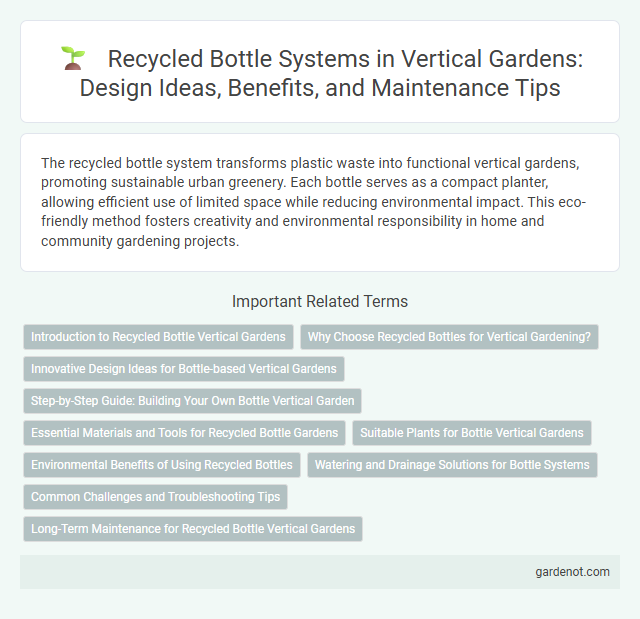The recycled bottle system transforms plastic waste into functional vertical gardens, promoting sustainable urban greenery. Each bottle serves as a compact planter, allowing efficient use of limited space while reducing environmental impact. This eco-friendly method fosters creativity and environmental responsibility in home and community gardening projects.
Introduction to Recycled Bottle Vertical Gardens
Recycled bottle vertical gardens transform plastic waste into sustainable urban green spaces by repurposing used bottles as planting containers. This eco-friendly system promotes recycling while maximizing space efficiency for growing herbs, flowers, and small vegetables in limited areas. By integrating water-saving techniques and creative design, recycled bottle gardens contribute to environmental conservation and urban biodiversity.
Why Choose Recycled Bottles for Vertical Gardening?
Recycled bottles create an eco-friendly and cost-effective vertical garden system by repurposing plastic waste into plant containers, reducing landfill contributions. Their lightweight and modular design allows easy customization and space-efficient plant arrangement, perfect for small urban spaces. Using recycled bottles also promotes sustainability and awareness about plastic pollution, aligning with green garden practices.
Innovative Design Ideas for Bottle-based Vertical Gardens
Recycled bottle systems transform plastic waste into functional vertical gardens by using innovative design ideas such as modular interlocking connections and self-watering mechanisms. These designs maximize space efficiency and promote plant health through built-in irrigation channels and drainage features. Integrating colorful, cut, and arranged bottles also enhances aesthetic appeal while supporting sustainable gardening practices in urban environments.
Step-by-Step Guide: Building Your Own Bottle Vertical Garden
Create a vertical garden using recycled bottles by first collecting clean, transparent plastic bottles and cutting them horizontally to form planting containers. Drill drainage holes in the bottle bottoms, fill with nutrient-rich soil, and insert seedlings or seeds suitable for vertical growth such as herbs, succulents, or small vegetables. Arrange and secure the bottles vertically on a sturdy frame or wall using ropes, racks, or nails to maximize space and ensure adequate sunlight exposure for healthy plant development.
Essential Materials and Tools for Recycled Bottle Gardens
Essential materials for a recycled bottle vertical garden include clean plastic bottles, sturdy strings or wires for hanging, and soil enriched with organic compost to support plant growth. Tools such as a sharp utility knife or scissors for cutting bottles, a drill or awl for making drainage holes, and a measuring tape to ensure uniform spacing enhance the assembly process. Proper selection of these components ensures durability, efficient water drainage, and optimal plant health in a sustainable vertical garden system.
Suitable Plants for Bottle Vertical Gardens
Suitably thriving plants for recycled bottle vertical gardens include herbs such as basil, mint, and parsley, which require minimal soil and water retention. Succulents and small flowering plants like petunias also adapt well to constrained root spaces and irregular watering patterns. These species optimize growth in bottle gardens by thriving in limited soil volume and benefiting from efficient water drainage inherent in the recycled bottle design.
Environmental Benefits of Using Recycled Bottles
Utilizing recycled bottles in vertical garden systems significantly reduces plastic waste by repurposing materials that would otherwise contribute to landfill overflow. This sustainable practice minimizes the demand for new plastic production, thereby decreasing carbon emissions and conserving natural resources. Incorporating recycled bottles also promotes eco-friendly gardening by fostering a circular economy and reducing environmental pollution.
Watering and Drainage Solutions for Bottle Systems
The recycled bottle vertical garden system employs innovative watering and drainage solutions to ensure optimal plant health by using gravity-fed drip irrigation that minimizes water wastage. Each bottle is designed with strategically placed drainage holes to prevent waterlogging, allowing excess water to flow out and avoid root rot. This sustainable approach maximizes water reuse and supports efficient plant hydration in compact urban gardening environments.
Common Challenges and Troubleshooting Tips
Recycled bottle systems in vertical gardens often face drainage blockages and inconsistent watering, leading to root rot and uneven plant growth. Ensuring proper hole size and placement in bottles enhances water flow and prevents clogging, while regular inspection and cleaning of the system maintain optimal moisture levels. Using a drip irrigation timer can help regulate watering schedules and reduce water wastage in recycled bottle vertical gardens.
Long-Term Maintenance for Recycled Bottle Vertical Gardens
Recycled bottle vertical gardens require regular inspection to prevent clogging and ensure proper water drainage, which helps maintain plant health over time. Using durable, UV-resistant bottles minimizes degradation and extends the lifespan of the garden system. Periodic cleaning of bottles and replacement of worn parts are essential for sustaining nutrient flow and avoiding buildup that could compromise plant growth.
Recycled bottle system Infographic

 gardenot.com
gardenot.com